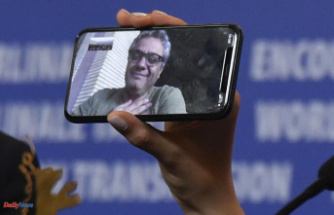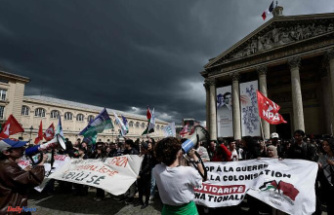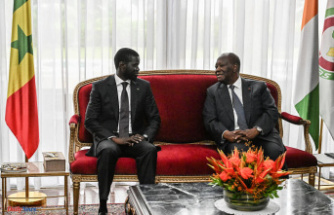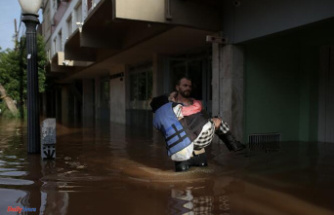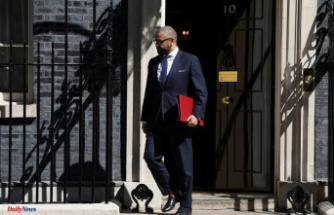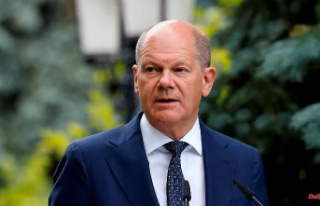The reactions to the visit of Scholz, Macron, Draghi and Iohannis in Kyiv were surprisingly positive in East-Central Europe. Above all, mistrust of Germany is likely to remain if the declarations of solidarity are not soon followed by action.
Yesterday's trip to Kyiv by Chancellor Olaf Scholz, French President Emmanuel Macron, his Romanian counterpart Klaus Iohannis and Italy's Prime Minister Mario Draghi was watched with excitement not only in their home countries and Ukraine, but also in Central and Eastern Europe. However, this view was nourished more by distrust than by the hope that the three big EU states would help Ukraine more instead of just showing solidarity.
The cover of the Polish news magazine "Wprost" revealed last week how great the distrust between Tallinn and Prague is, especially towards Germany and France. This showed Macron and Scholz speaking into a telephone receiver while Putin was bathing in blood on the other end. One could not symbolize more clearly what people in Poland or the Baltic States think of Scholz's and Macron's efforts to find a diplomatic solution through direct negotiations with Putin. "It's pointless to talk to Putin," said Estonian Prime Minister Kaja Kallas several times. A criticism that Scholz also had to listen to when he visited the Baltic States in early June.
There is no belligerence behind the criticism of the eastern EU and NATO partners over the phone calls, but rather the concern that a peace plan presented in May by Berlin, Paris and Rome could force Ukraine into a peace that is unfavorable for Ukraine. It is not uncommon for the terms "dictated peace" or "Minsk 3" to be mentioned. There is concern among eastern neighbors that this will not bring lasting peace, but rather strengthen Russia's imperial dreams.
This suspicion was reinforced by Macron's statements that one should "not humiliate" Putin and Germany's reluctance to supply heavy weapons to Ukraine. The recent German-Polish dispute over the supply of German tanks to Poland, intended in the ring exchange as a replacement for Soviet-type tanks that Poland was supplying to Ukraine, was just the icing on the cake to create mistrust in the region against the two most important EU states, which have been accused of an unworldly Russia policy in East Central Europe for years.
But the great concern of the East Central Europeans regarding the visit to Kyiv has not been confirmed. Rather the opposite. The clear message from Scholz and the other Kyiv visitors that they would support the EU accession statutes of Ukraine and Moldova was received with benevolence and relief in East-Central Europe. Poland's President Andrzej Duda, who has visited the Ukrainian capital twice since the Russian invasion and calls Ukrainian President Selenskyi daily, not only praised the visit of Scholz, Macron, Draghi and Iohannis on Twitter, but even thanked them for it. Just a few days ago, the same Duda accused the German government of breaching its word regarding the delivery of German tanks to Poland.
The reaction in the other East Central European countries was no different. However, it would be wrong to think that Germany, France and also Italy are treated with less suspicion in the region. The fact that Scholz, Macron and Draghi were accompanied to Kyiv by Romanian President Iohannis was a clear signal to the region that they were not planning to go it alone. As it became known today, after returning to Paris, Macron called his Polish counterpart to discuss the visit to Kyiv.
But all the words of praise, especially for Berlin, come with a big but. This has to do with Scholz's hesitant attitude on the subject of arms deliveries. In Kyiv, too, the Chancellor kept a low profile in this regard.
This reluctance could also have far-reaching consequences for the future of the European Union. The eastern EU partners interpret the German actions as a persistent unwillingness on the part of Berlin to take their concerns and security needs seriously. What could lead to the fact that the federal government that stipulated the strengthening of the EU in the coalition agreement weakens it in the region. Ironically, the British Brexit Prime Minister Boris Johnson is already in the starting blocks and offers Ukraine and the East Central Europeans closer cooperation. So far, the London advances have not been rejected.


